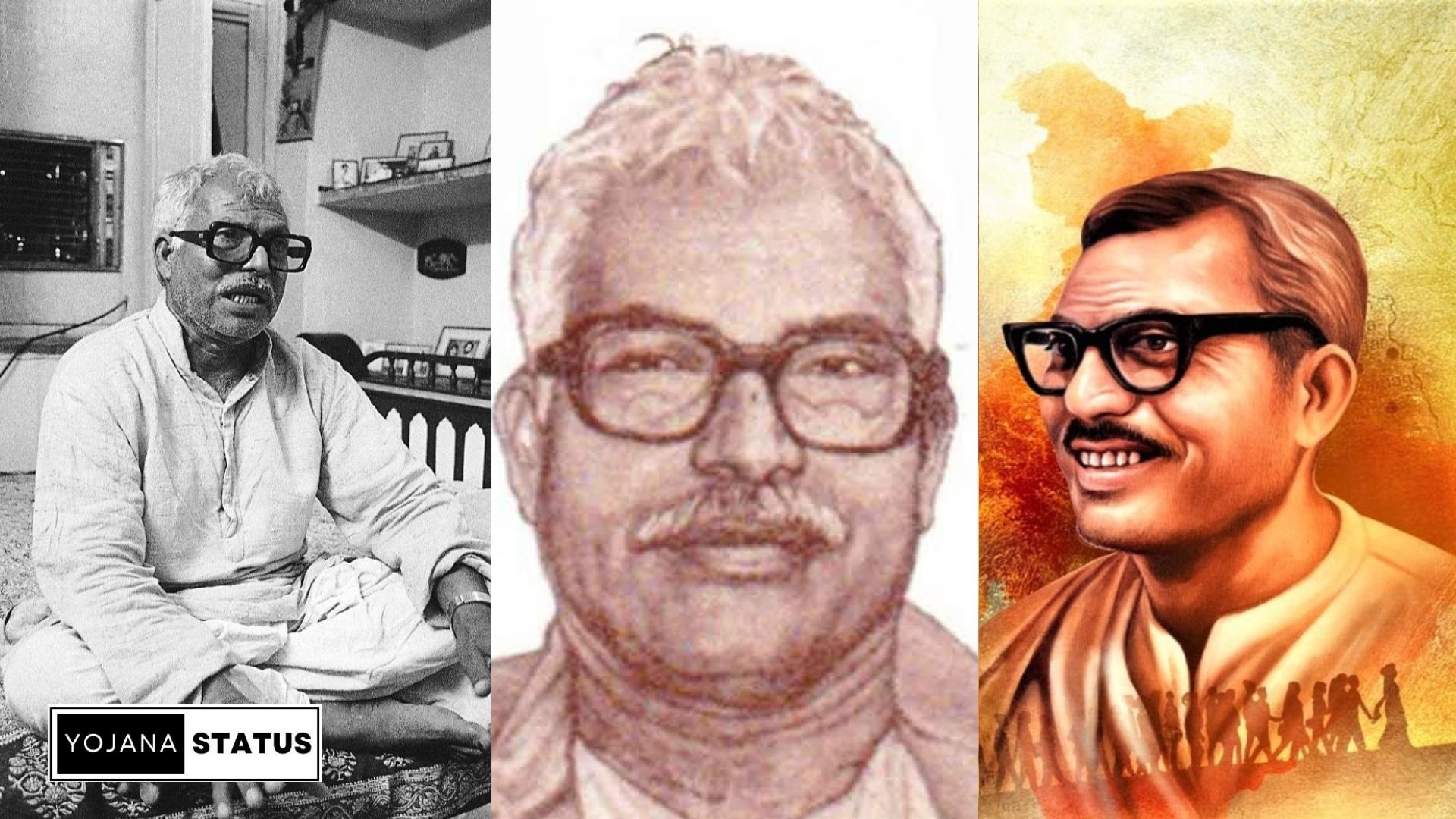Karpuri Thakur Wikipedia, Wiki, Caste, Biography, Family, Bharat Ratna, Who Is, Party, Cast
Karpuri Thakur Wikipedia, Wiki, Caste, Biography, Family, Bharat Ratna, Who Is, Party, Cast – Karpoori Thakur, affectionately known as Jan Nayak, left an indelible mark on Indian politics as a visionary leader and advocate for social justice. This comprehensive exploration delves into various facets of his life, from his early years to his illustrious political career, personal life, and the enduring legacy he leaves behind.
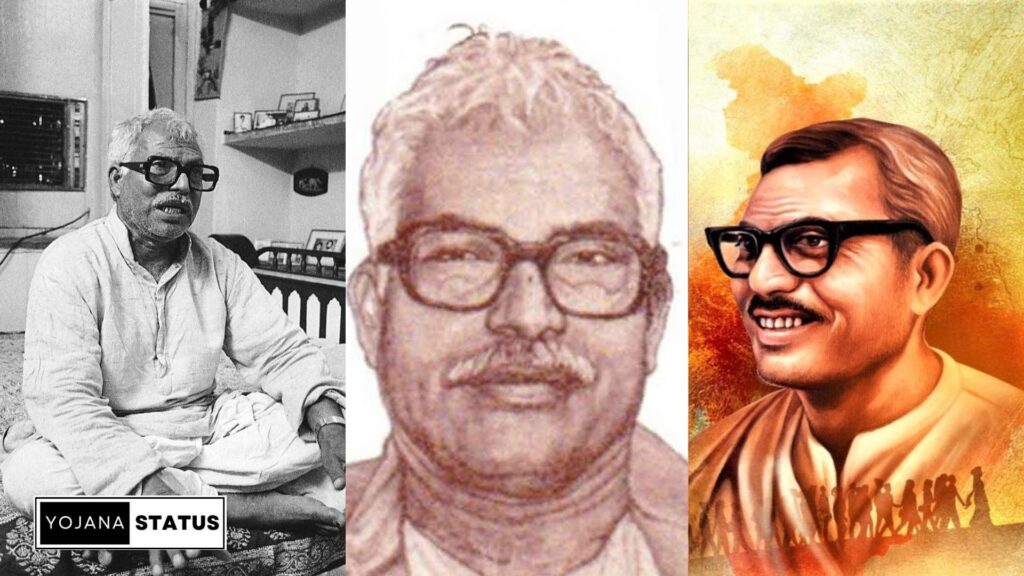
Karpuri Thakur Biography:
| Category | Information |
|---|---|
| Full Name | Karpuri Thakur |
| Nicknames | Jan Nayak |
| Birth Date | January 24, 1924 |
| Birthplace | Pitaunjhia village (now Karpoorigram), Samastipur, Bihar |
| Nationality | Indian |
| Profession | Politician, Freedom Fighter |
| Famous For | Serving as Chief Minister of Bihar twice |
| Awards & Honours | Bharat Ratna (2024) |
| Net Worth | $1 million – $4 million dollars |
Karpuri Thakur Early Life & Background:
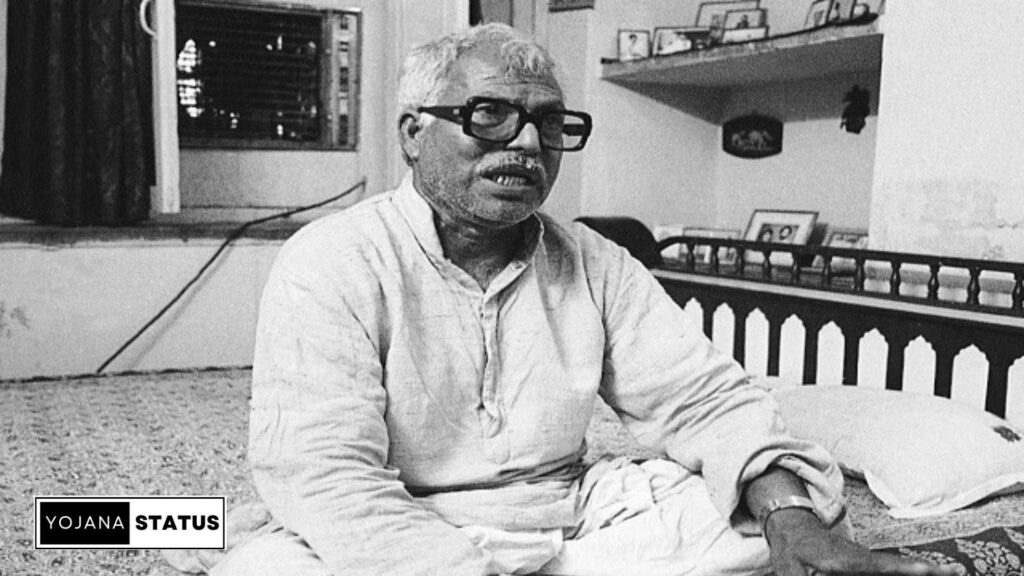
Born on January 24, 1924, in Pitaunjhia village (now Karpoorigram), Samastipur, Bihar, Karpoori Thakur’s early life was steeped in simplicity and humility. His given name was Karpuri Thakur, and he later earned the endearing nickname “Jan Nayak.” Raised in a family with a background in the Nai (Hajjam) caste, traditionally associated with barbering, Thakur’s roots shaped his values and perspective on social issues.
Karpuri Thakur Measurements:
In terms of physical attributes, Karpoori Thakur stood at approximately 172 cm, or 5′ 8″. His presence was marked by a stature that symbolized his commitment to the causes he championed. With black eyes that reflected determination, Thakur’s physical demeanor resonated with the strength of his convictions.
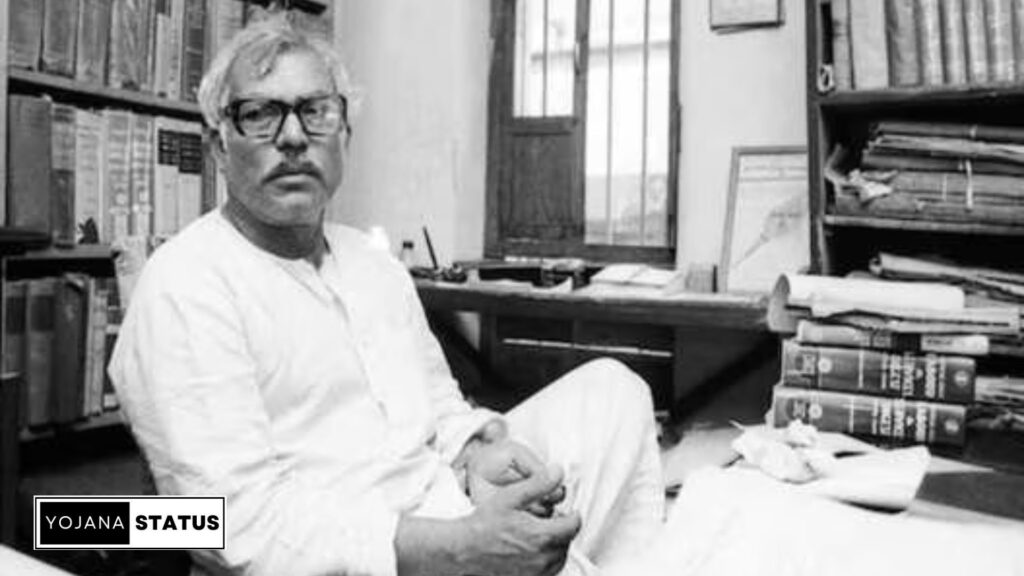
| Category | Information |
|---|---|
| Height | Approximately 172 cm (5′ 8″) |
| Eye Colour | Black |
Karpuri Thakur Education Qualification:
Thakur’s journey in education began in a local village school, and he later pursued a Bachelor of Arts (BA) degree at C.M. College, Darbhanga. His academic pursuits, however, took a backseat to his passion for social and political change. Influenced by leaders like Ram Manohar Lohia, Thakur dropped out of college to enter the dynamic realm of Indian politics.
| Category | Information |
|---|---|
| School | Local village school |
| College/University | C.M. College, Darbhanga |
| Educational Qualification | Bachelor of Arts (BA) – Dropout |
Karpuri Thakur Family Background:
Karpoori Thakur hailed from a modest family background. His father, Gokul Thakur, worked as a barber and farmer, embodying the resilience of rural life. Thakur’s family included two brothers and six sisters, each contributing to the fabric of his early life. The simplicity of his upbringing remained a constant thread throughout his political career.
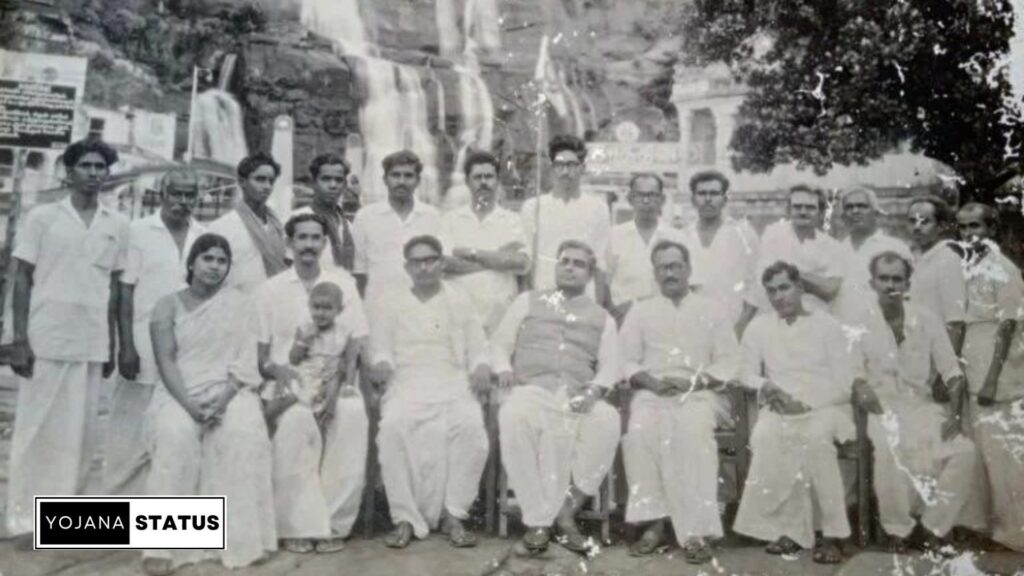
| Category | Information |
|---|---|
| Father | Gokul Thakur |
| Mother | Ramdulari Devi |
| Wife | Phooleshwari Devi |
| Son (Elder) | Ram Nath Thakur |
| Son (Younger) | Birendra Kumar Thakur |
| Daughter | 1 (Name Not Known) |
| Brother (Younger) | Ramsugat Thakur |
| Sister | Galho |
| Sister | Siya |
| Sister | Rajo |
| Sister | Sita |
| Sister | Parvati |
| Sister | Shail |
Karpuri Thakur Relationship Status:
Karpoori Thakur’s personal life was characterized by his commitment to simplicity and adherence to principles. His wife, Phooleshwari Devi, a homemaker, stood as a pillar of support throughout his journey. The couple was blessed with two sons, Ram Nath Thakur and Birendra Kumar Thakur, and a daughter. Thakur’s personal choices reflected his dedication to social service, including his refusal to allow dynasty politics within his family.
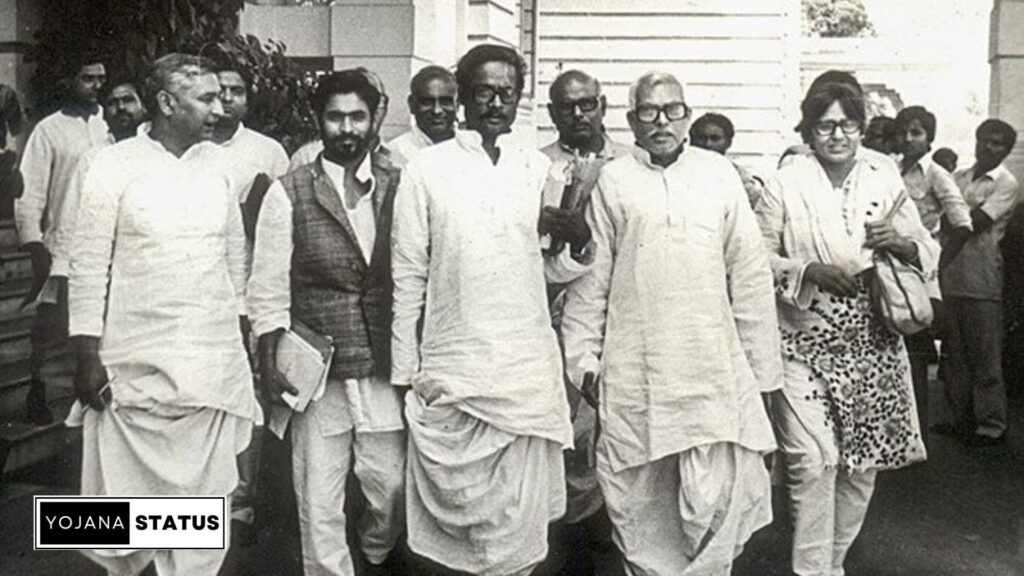
Karpoori Thakur, at the time of his death in 1988, was married to Phooleshwari Devi. The details of his relationship status during his lifetime are not extensively documented. However, his steadfast partnership with Phooleshwari Devi suggests a stable and enduring relationship.
Karpuri Thakur Net Worth:
Karpoori Thakur’s estimated net worth ranged between $1 million and $4 million dollars. Despite his impactful political career, his financial worth reflected a modest lifestyle. Thakur, often lauded for his simplicity and commitment to social justice, did not amass significant personal wealth. His dedication to public service and advocacy for the marginalized took precedence over financial gains. This modest net worth aligns with his reputation as a leader who prioritized the welfare of the people, embodying the principles of simplicity and selfless service throughout his life.
Karpuri Thakur Controversy:
Karpoori Thakur, also known as Jan Nayak, was a prominent political figure whose career was not without its share of controversies. Here is a detailed list of controversies that marked certain periods of his political journey:
- Allegations of Rape:
- In a significant controversy, Thakur faced allegations of rape by Premlata Rai, a 35-year-old teacher from Kathmandu. Rai claimed that the incident occurred in 1975 when Thakur was living in Nepal during the emergency.
- Rai alleged that Thakur raped her while she was asleep in the house of Professor S.N. Verma in Kathmandu. Thakur vehemently denied the accusations, maintaining his innocence throughout the legal proceedings.
- Political Conspiracy:
- Thakur consistently asserted that the rape allegations were politically motivated, orchestrated by his rivals to tarnish his public image.
- The court eventually rejected the case, with judges noting that the charges appeared to be part of a larger political conspiracy against Thakur.
- Impact on Public Image:
- The controversy had a profound impact on Thakur’s public image, leading to widespread speculation and discussions within political circles.
- Thakur’s resilience during this period showcased his ability to withstand adversity and maintain his dedication to public service.
- Legacy of the Controversy:
- Despite being acquitted of the charges, the controversy left a lasting impact on Thakur’s legacy, with some sections of society continuing to associate his name with the allegations.
- Thakur’s supporters viewed the controversy as a political ploy, while critics raised questions about the integrity of the legal proceedings.
- Maintaining Innocence:
- Throughout the controversy, Thakur consistently maintained his innocence, emphasizing that the accusations were fabricated to undermine his contributions to politics and social welfare.
- The legal battle and subsequent rejection of the case reinforced Thakur’s credibility among his followers.
- Political Rivalry:
- The timing of the rape allegations raised suspicions of political maneuvering, especially considering Thakur’s position and influence in Bihar politics.
- Thakur’s adversaries seized the opportunity to tarnish his reputation, highlighting the cutthroat nature of politics during that period.
- Media Scrutiny:
- The controversy attracted significant media attention, further intensifying the scrutiny on Thakur’s personal life and political career.
- Media coverage played a crucial role in shaping public perception, influencing the narrative surrounding the allegations.
- Legal Proceedings:
- The case went through legal proceedings, and Thakur was ultimately cleared of all charges. The rejection of the case by the court added weight to his claims of innocence.
- Thakur’s legal victory provided him with a platform to reassert his commitment to public service without the cloud of controversy hanging over him.
The controversy surrounding the allegations of rape against Karpoori Thakur was a significant chapter in his political journey. While it posed challenges to his public image, Thakur’s resilience, legal victory, and continued service to society helped him overcome the controversy. The episode remains a noteworthy aspect of his legacy, illustrating the complexities and challenges that often accompany a career in public service.
Karpuri Thakur Career Beginnings:
Career: Thakur’s political journey commenced in 1952 when he became an MLA for the first time from the Tajpur constituency as a Socialist Party candidate. Over the years, he aligned with various political parties, including the Bharatiya Kranti Dal, Janata Party, and Lok Dal. His impactful tenure as the Deputy Chief Minister and Education Minister of Bihar from March 1967 to January 1968 marked the beginning of significant policy changes.
Thakur served as the Chief Minister of Bihar twice, first from December 22, 1970, to June 2, 1971, and then from June 24, 1977, to April 21, 1979. His leadership was characterized by groundbreaking policies, including the prohibition of liquor sales and consumption, land reforms for peasants, and educational changes promoting Hindi as the major language. Despite facing challenges and controversies, Thakur’s political resilience and commitment to social justice remained unwavering.
Karpoori Thakur’s illustrious career in Indian politics spanned several decades, marked by resilience, dedication to social justice, and a commitment to uplifting the marginalized sections of society. Here, we delve into key points that highlight the significant milestones and contributions of his political journey:
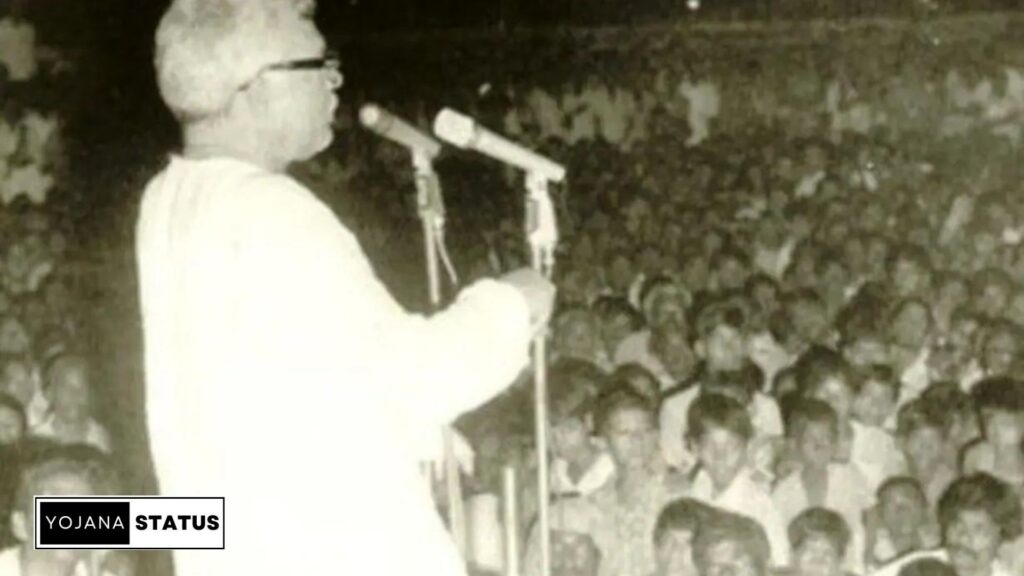
- Early Political Engagement (1952): Karpoori Thakur entered politics in 1952 when he became a Member of the Legislative Assembly (MLA) for the first time, representing the Tajpur constituency as a candidate of the Socialist Party.
- Deputy Chief Minister and Education Minister (1967-1968): From March 1967 to January 1968, Thakur served as the Deputy Chief Minister and Education Minister of Bihar. During this tenure, he initiated key changes in education policies, reflecting his vision for a more inclusive and accessible education system.
- Chief Minister of Bihar – First Term (1970-1971): On December 22, 1970, Karpoori Thakur assumed the office of Chief Minister of Bihar for the first time. His tenure was marked by groundbreaking policies, including the prohibition of liquor sales and consumption, a move aimed at addressing social issues associated with alcoholism.
- Member of Parliament (1977): In 1977, Thakur expanded his political influence by becoming a Member of Parliament (MP) for the first time, representing the Samastipur constituency.
- Chief Minister of Bihar – Second Term (1977-1979): Thakur’s political journey reached another pinnacle when he assumed the role of Chief Minister of Bihar for the second time on June 24, 1977. His second term was characterized by efforts to implement the Mungeri Lal Commission report, recommending reservations for Backward Castes in government jobs.
- Advocacy for Backward Castes and OBCs: Karpoori Thakur emerged as a vocal advocate for the rights of Backward Castes and Other Backward Classes (OBCs). His dedication to the cause led to the formulation of the famous “Karpoori Formula,” a policy supporting reservations for these communities.
- Educational Reforms: As the Education Minister of Bihar, Thakur implemented significant educational reforms. Notably, he removed English as a compulsory subject from the curriculum and introduced measures to make education free up to the 8th standard.
- Pro-Poor Initiatives: Thakur’s political agenda was consistently pro-poor, and he actively engaged in protests and strikes to champion the rights of corporate workers and government employees. His commitment to social justice extended to various sectors, reflecting a holistic approach to addressing societal inequalities.
- Legacy of Simplicity: Throughout his political career, Karpoori Thakur maintained a lifestyle characterized by simplicity and frugality. His dedication to the well-being of the common people was evident in both his policies and personal choices.
- Posthumous Recognition: Despite facing controversies during his lifetime, Thakur received posthumous recognition for his contributions. In 2024, the Government of India conferred upon him the Bharat Ratna, the highest civilian honor, acknowledging his enduring impact on Indian politics.
Karpoori Thakur’s career exemplifies a rare combination of political astuteness, social consciousness, and a genuine commitment to the welfare of the underprivileged. His legacy continues to inspire leaders and citizens alike, serving as a reminder of the transformative power of principled leadership in the realm of politics.
Karpuri Thakur Awards:
Karpoori Thakur received several honors and awards throughout his life, recognizing his significant contributions to Indian politics and society. Here is a list of the awards bestowed upon him:
- Karpoori Thakur’s Birthplace Renaming:
- His birthplace, Pitaunjhia, was renamed Karpuri Gram after his demise in 1988.
- Commemorative Stamps:
- The Department of Posts released commemorative stamps in his memory in 1991 and 2024.
- Bharat Ratna:
- Awarded the Bharat Ratna, India’s highest civilian honor, by the Government of India in 2024.
- Commemorative Coin:
- A commemorative coin of denomination Rupees 100 was launched in 2024, further acknowledging his contributions.
These honors reflect the deep respect and recognition accorded to Karpoori Thakur for his leadership, service to the people, and enduring impact on the political landscape of Bihar and India.
Karpuri Thakur Facts:
- Socialist Ideals: Thakur was a staunch follower of socialist ideals, and his policies reflected a commitment to reducing socio-economic disparities.
- Prohibition Policy: One of Thakur’s significant contributions was the implementation of a prohibition policy on liquor sales and consumption in Bihar during his tenure as Chief Minister.
- Reservation Advocacy: Thakur was a vocal advocate for reservations in government jobs for Backward Castes and Other Backward Classes (OBCs), leading to the famous “Karpoori Formula.”
- Educational Reforms: As Education Minister, he introduced key changes such as removing English as a compulsory subject and making education free until the 8th standard.
Conclusion:
In conclusion, Karpoori Thakur’s life journey encapsulates the essence of a visionary leader dedicated to the service of the people. From his early years marked by simplicity and humility to his impactful political career and enduring legacy, Thakur’s story inspires generations. His commitment to social justice, evidenced by policy changes and advocacy for the marginalized, distinguishes him as a true Jan Nayak. Karpoori Thakur’s life teaches us that the pursuit of principles and selfless service can bring about positive transformations in society. As we reflect on his legacy, we recognize the timeless relevance of his ideals in shaping a more just and equitable future.
Also Read:
- Vijay Kumar Chaudhary Caste, Biography, History, Education, Daughter, Contact Number
- Abhijit Iyer-Mitra Wikipedia, Age, Biography, Wiki, Married, Education, Mother Acid, Wife, Spouse, Family, Instagram
FAQ:
Who is Karpuri Thakur?
Karpuri Thakur, affectionately known as Jan Nayak, was a respected Indian politician and freedom fighter. Born on January 24, 1924, in Bihar, he served as the Chief Minister of Bihar twice and played a key role in social and educational reforms.
Karpuri Thakur kis cast ke the?
Karpuri Thakur Nai (Hajjam) caste se the, jo traditionally ek barber community ke roop mein jaani jaati hai.
Karpuri Thakur kon the?
Karpuri Thakur ek prashanshile neta aur swatantrata senani the, jo Bihar ke mukhyamantri bhi do baar rahe aur samajik sudharon mein mahatva purna bhumika nibhaye. Unhe “Jan Nayak” ke naam se bhi jana jata hai.
Caste of Karpuri Thakur?
Karpoori Thakur belonged to the Nai (Hajjam) caste. This caste is traditionally associated with the occupation of barbering. Thakur’s family background reflected simplicity and resilience, shaping his values as he went on to become a prominent political figure known for his dedication to social justice.
Who was Jan Nayak known as?
Jan Nayak was the popular name given to the ardent socialist leader Karpoori Thakur. He earned this title due to his lifelong dedication to advocating for the rights and well-being of the poor and marginalized people in Bihar.
